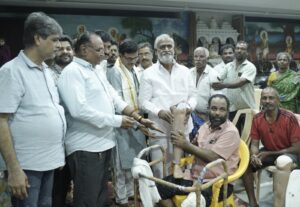Chennai, 7 August 2024: Dr. Vijay Viswanathan, Managing Director & Chief Physician MV Hospital for Diabetes and Prof M Viswanathan Diabetes Research Centre Royapuram led a national drive “Save the Feet, keep walking campaign” in 2022 across India with the National Research Society for Study of Diabetes in India (RSSDI), the largest organisation of Diabetes Care professionals in the world. The main aim of the campaign was to assess the foot for Loss of Protective Sensation (LOPS) in people with diabetes to detect neuropathy at early stage to prevent Diabetic Foot complications. The HCPs across India joined this 1-month long campaign to raise awareness among people and educate them towards regular foot assessment.

As part of this campaign, a total of 54000 people with diabetes had undergone foot examination. Dr Vijay Viswanathan and his co-authors reported the data for 33259 participants in the article published in the journal BMJ OPen Diab Res Care.
The authors found about one-fourth of the population who underwent examination had high risk feet. The risk was classified as high risk based on the presence of LOPS or Peripheral Artery Disease and one or more of the other risk factors such as history of DFU or lower extremity amputation or end-stage renal disease) as per International Working Group on the Diabetic Foot (IWGDF) guidelines 2023.
Dr. Vijay Viswanathan said that nearly 3/4th of the study population who had HR feet were found to have renal and retinal complications. Heel fissures was found to increase 4.6 times the odds of having HR feet. Presence of callus or corn, age > 45 years, smoking habit, poor glycemic control, male gender were other factors associated with the presence of HR feet.
Low- and Middle-income countries including India face high burden of diabetes and hence foot related problems among them. Poor foot care practices mainly barefoot walking and poor management of foot ulcer may lead to amputation. Wound care is an integral part of healthcare system. Wound clinics play a crucial role in modern healthcare addressing a wide range of acute and chronic wounds. The demand for awareness, early screening of foot and wound care services has been steadily increasing, making it vital for healthcare professionals to stay informed about best practices in preventing and management of Diabetic Foot conditions.
An effective translation of appropriate treatment guidelines on the early diagnosis and management of diabetic foot will improve the quality of foot care practices.







More Stories
VS Medical Trust Celebrates the Spirit of Cancer Survivors
SIMS Hospital Performs India’s First Combined Open-Heart Valve Replacement and TAVR Valve-Specialised Aortic Graft Surgery
Kauvery Hospital’s 24×7 Diabetes Helpline Crosses 1500 Days of Lifesaving Support Across Tamil Nadu